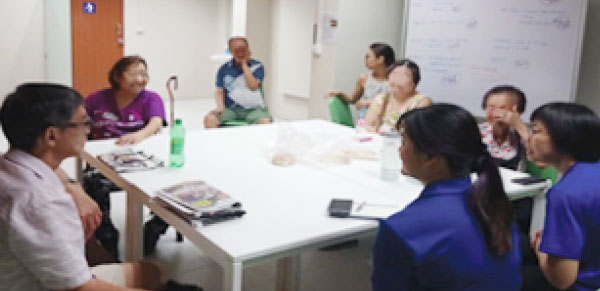By Fei Yue Community Services
 Having a progressive and future ready social service workforce will shape how the nation addresses evolving community needs. There is therefore a greater need for social service agencies like Fei Yue, to focus on building capabilities and deepening social work/service skills of its workforce in order to raise strong and sustainable communities of tomorrow.
Having a progressive and future ready social service workforce will shape how the nation addresses evolving community needs. There is therefore a greater need for social service agencies like Fei Yue, to focus on building capabilities and deepening social work/service skills of its workforce in order to raise strong and sustainable communities of tomorrow.
With about 600 passionate employees, serving an average of 80,000 beneficiaries annually from across 34 centres nationwide, Fei Yue places a significant emphasis on developing our people, be it via talent development and management, succession planning initiatives, or creating and sustaining a culture of inclusion. These human capital strategies take the form of external and overseas trainings, specialised in-house trainings, competency development frameworks, developing specialist tracks and career progression pathways, cross-functional trainings and rotations, sharing of knowledge through case conferences and by developing an integrated case management system.
Besides nurturing our people with the right knowledge and skills, providing a platform to interact with multi-agencies and exchanging best practices will empower them to serve the community better and more effectively. One of such trainings we found beneficial was the ESTHER Network Collaboration coaching course, organised by Tan Tock Seng Hospital.
Empowering not only our employees, but also the person-in-need, the ESTHER concept was introduced into Singapore in 2016 and focuses on creating a robust person-centred care ecosystem. With that, our social service professionals learnt to appreciate the perspectives and issues faced by the ground - patients or caregivers. They are constantly reminded to prioritise the needs of who they serve, be it the elderly, mental health clients, caregivers, just to name a few.
Many times, the social service workforce employs or proposes solutions and measures for people with needs as a group, instead of targeted solutions from the perspectives and needs of patients and caregivers. For example, by adopting the ESTHER concept on caregivers of dementia patients, this exercise enabled our employees to deep dive into the individual caregiver’s needs, working directly and obtaining first-hand information from them. They were then able to propose effective improvements to help curb stress levels of caregivers for mental health patients, that cut across multiple agencies. In addition, by doing so, they were able to tap on the caregiver’s knowledge and insights to re-design care experiences and benefit even more caregivers.
This is the “network” effect that we hope to see more in the industry and it will positively help Singapore progress towards a seamless patient and caregiver care model, and overcome the fragmentation between the different providers of care. We believe that the valuable opportunities and exposure for our staff to collaborate with other agencies to execute change and improve societal gaps, is empowering and powerful.
Find related items:
Issue 9: March 2021